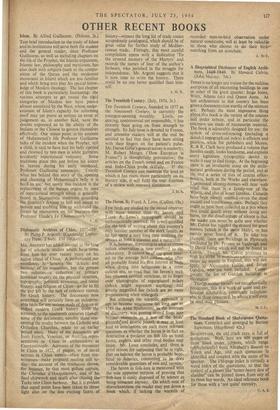MR. ARGENTI has added another to the long list of
scholarly studies which have come from him for over twenty years on his native island of Chios. A perfectionist par excellence, he• laments the 'defects and lacunae' of his researches, but the present two volumes--a collection of primary historical sources on the physical structure, topography, political, economic, and social history, and religion of Chios—go far to fill the gap left by the lack of coherent records for Greek history. The documents now assembled will certainly form an indispens- able basis for any serious study .of_Acan or indeed modern Greek history frcift* the sixteenth to the nineteenth centuries (though some of the documents, notably those con- cerning the rivalry between the Catholic and Orthodox Churches, relate to an earlier period also). Many of the documents are from French, Venetian, or Austrian repre- sentatives in Chios or ambassadors at Constantinople. Accounts of the massacres in Chios in 1822, of plague, or of naval actions in Chian waters—often from eye- witnesses—make poignant reading still to- day—the account of the resolution shown, for instance, by that most gallant captain, the Chevalier d'Hocquincourt, and of his final shipwreck and death after chasing the Turks into Chios harbour. But it is evident that equal pains have been taken to throw light also on the less exciting facets of
history—witness the long list of trade routes scrupulously catalogued, which should be of great value for further study of Mediter- ranean trade. Fittingly, this most careful compilation opens with a dedication `To the revered memory of the Martyrs' and records the names of four of the author's forbears, who perished in the struggle for independence. Mr. Argenti suggests that it is now time to write the history. There could be no one better qualified than him- self.
A. M. R.


































 Previous page
Previous page